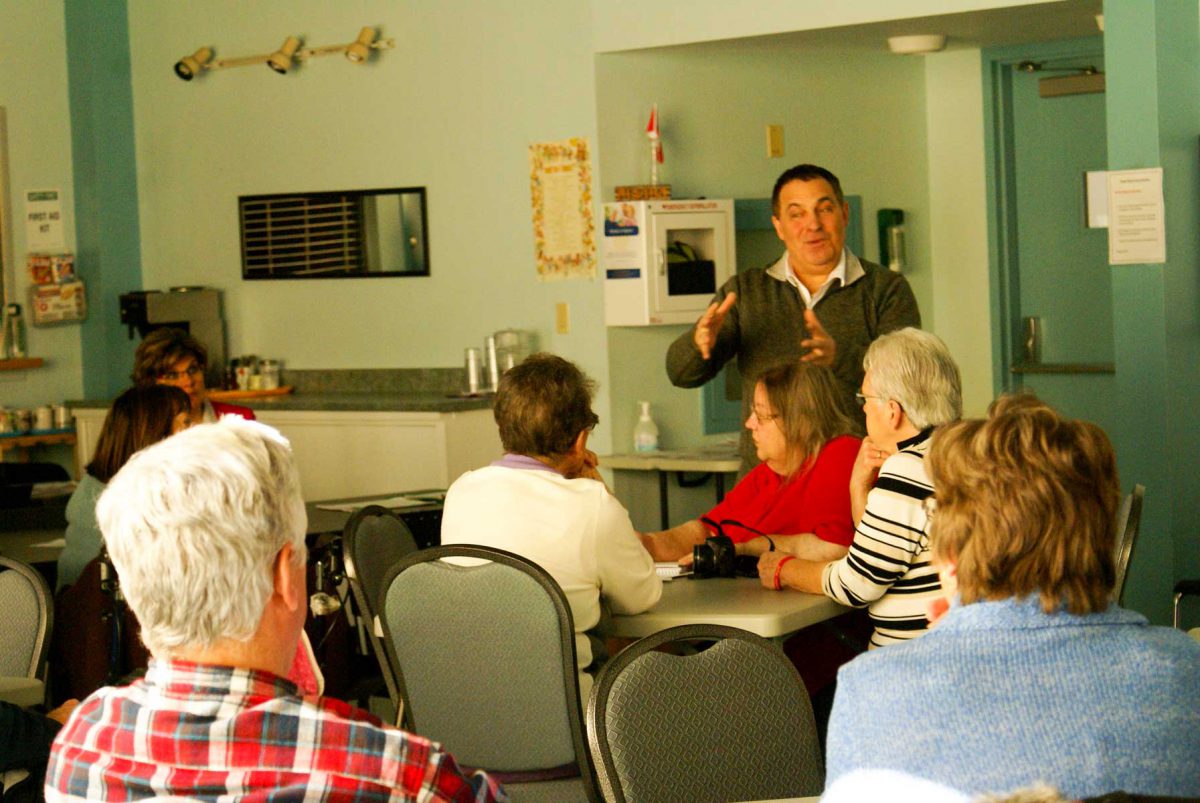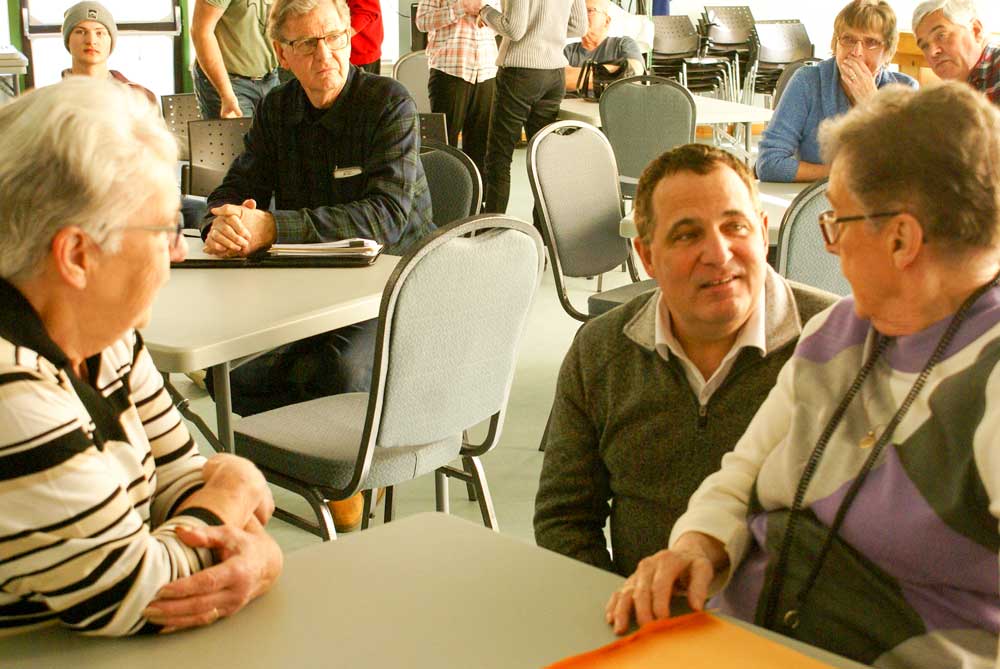ESPANOLA––“Canada needs a National Seniors’ Strategy to address needs along the full continuum of care,” said Nickel Belt MP Marc Serré at a community forum in Espanola on Saturday, March 17. MP Serré is passionate about the topic and has been hosting forums across the country to discuss how Canada can improve access to affordable housing, income security and overall quality of life for seniors.
“I’m here as a Member of Parliament (MP) representing all constituents,” MP Serré stated. “We need to get the conversation going, get some action happening.” His priority is income security for seniors. “We need to get seniors out of poverty,” he continued, “to provide them with choices for housing and social activities. Your feedback will support the development and implementation of a National Seniors’ Strategy.”
According to Statistics Canada, over 15 percent of our populatio

n at the last census was over 65. That number was 7.6 percent in 1960. MP Serré noted that for the first time there are more people aged 65 and older than there are children aged 0-14 years. “By 2024 Canadians 65 and older will account for 20.1 percent of the population,” he explained, “and by 2036 seniors are expected to make up 25 percent of the population. We need to act now and to plan ahead to ensure that seniors are guaranteed a high quality of life and dependable access to programs and services.”
“The federal government has taken steps to address the issue,” MP Serré said. “The 2017 budget invested $6 billion over 10 years to improved access to home care and $5 billion over 10 years to support mental health initiatives. Over 900,000 seniors (80 percent are women) are receiving enhanced Guaranteed Income Supplement (GIS) benefits up to $947 per year and the age of eligibility for Old Age Security (OAS) and GIS was restored to 65 years. A $40 billion investment through the National Housing Strategy will see more than 12,000 new affordable housing units built for seniors and repair 300,000 existing affordable units. As well, the Canada Pension Plan will be enhanced to increase the maximum level of pension earnings to 14 percent as of 2025.”
“Through New Horizons for Seniors, community-based projects can receive up to $25,000,” he continued. “We are lowering prescription medication prices through a $140.3 million investment over five years starting in 2017-18, and we’re looking at a universal pharmacare program.”
“The Canadian Medical Association (CMA) has actively worked on getting the federal government moving toward a national pharmacare program. We also need more affordable medications and we need more medications covered. Especially on the seniors’ side, where medications can be very costly.” He noted that Dr. Eric Hoskins, former Ontario Minister of Health, has been hired and will report on a pharmacare program by the end of this year. “It will cost $19-22 billion,” he acknowledged, “but that’s completely universal.” It might mean working with existing private sector plans and addressing the gaps, and the model would likely include a cost sharing component with the provinces.
Last year MP Serré made a private members motion, M-106 “Seniors,” that contained four broad objectives. After the motion was adopted by the House of Commons on May 17, 2017, the House of Commons Standing Committee on Human Resources, Skills and Social Development and the Status of Persons with Disabilities began a study, “Advancing Inclusion and Quality of Life for Canadian Seniors.” The study has three major themes: access to affordable and accessible housing, including aging in place; income security for vulnerable seniors; and community programs that promote social inclusion and recognize the social determinants of health.
“We tend to focus on health,” MP Serré said, “but the other part is social discrimination. Seniors get pushed aside. Their contributions aren’t valued. We don’t recognize the value of the work that seniors do after they retire. CARP (an advocacy association for older Canadians) volunteers contribute $2.2 million in volunteer hours a year,” he continued. “We don’t respect our elders.” He noted that Indigenous communities rely on their elders for their wisdom, their knowledge and their teachings. “We’ve lost that in our culture.”
In the 50 forums MP Serré has hosted across Canada he has been encouraging people to get involved regardless of which political party they support. “We have to find ways to overcome partisan issues,” he said. “After the election is done we have to work together.”
One participant liked the idea of bringing seniors’ incomes up to a minimum level but was concerned about the cost and how it affects Canada’s deficit. He suggested shifting funds from external aid programs, and prioritize seniors higher. “You don’t feed the neighbour’s children and starve your own,” he said.

Seniors’ Strategy Forum at Espanola Seniors Drop In Centre on Saturday, March 17.
“Our deficit as a percentage of GDP is still a lot lower than most countries,” MP Serré replied. “I advocate that we should not have seniors living in poverty, so let’s find the money somewhere. We can look at shuffling dollars but we do need to invest.” He also believes that Canada can continue to support other countries. “We have a responsibility,” he said. “There is famine, atrocities and wars. We also have a responsibility to help our own First Nations communities that we have been awful to in the last 150 years. We need to address that and put money there.”
A health care worker suggested that all those working in health care, and not just the CMA, would have valuable input. “The Canadian Nurses Association (CNA) wrote a report that offered concrete suggestions that were costed out and demonstrated cheaper benefits,” she said.
MP Serré agreed. “At the end of the day it’s very important that we receive feedback from all associations and organizations. The CNA has been very supportive and practical. Nurse practitioners are very important. There are 32 or more laws that contain the word “doctor.” If you just added “nurse practitioner” it would make a difference for access to care overnight.”
Clawbacks to income security payments and complex paperwork requirements were other concerns. MP Serré noted that the government is working to streamline and improve service delivery but suggested people contact their MP to obtain support for accessing programs. “We can’t deliver the programs but have access to staff,” he said. “We are here to bridge that gap.”
Long waiting lists for limited affordable housing, access to care, elder abuse and home care rounded out the concerns in Espanola. One participant mentioned a government policy to provide more housing for families, noting that the Canadian Mortgage and Housing Corporation won’t fund a building if seniors will be the only tenants. This inclusive approach has often left women and seniors neglected as they may be denied access to affordable housing. Often members of this group have limited income and can’t afford market rents.
“Waiting lists across the country can be three to six years for affordable housing,” said MP Serré. “Ideally, you want to encourage seniors to stay at home as long as they can. As a government, how do we better meet these challenges?”
He thanked participants for their questions. “You have to maintain this level of engagement,” he encouraged the audience. “You need to keep pushing the issue at all levels of government: municipal, provincial and federal.” Contact Marc Serré’s constituency office at 1-800-267-4829 to contribute to the conversation.




